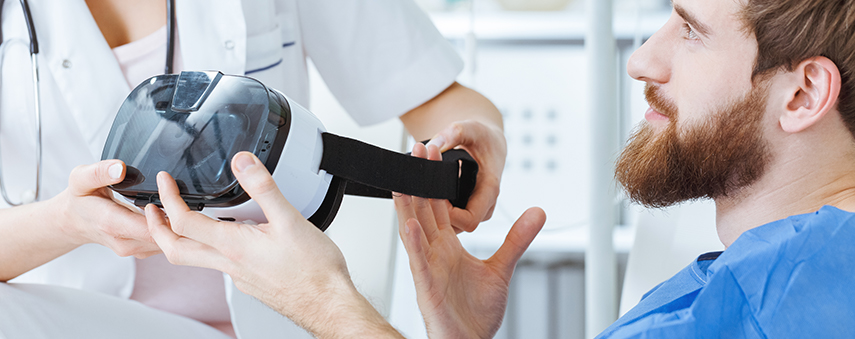4 exciting uses for VR in the future of healthcare

VR is in its infancy, but some companies are developing exciting uses for it. The future of healthcare looks set to be a driving force behind VR development.
Healthcare has always been at the cutting edge of technological advancements. Its inherent need for constant evolution has led to new and exciting developments, created to deliver more effective ways to improve accuracy, efficiency and understanding.
From the first health information management (HIM) systems in the 1920s to data-driven patient records in the late 90s, not to mention robot-assisted surgery and 3D printing of prosthetics, healthcare has improved markedly as a direct result of these pioneering advancements. AI has made significant inroads in the past few years, but how does VR factor in?
The use of VR in healthcare has unlimited potential which can only be held back by the capabilities of the ever-improving technology. Improved diagnosis, the discovery of new treatments and more effective care plans are all areas in which VR plays a pivotal role and will do so even further in the future.
Understanding & Awareness
There appears to be no better use for VR than to foster understanding, empathy and awareness of diseases and conditions. Take for example Parkinson’s disease. This nervous system disorder causes progressive damage to the brain, and to live with Parkinson’s is little understood by many.
AbbVie, a pharmaceutical research and development company, developed a VR experience alongside The Virtual Dutch Men, which puts the average person in the body of a Parkinson’s disease sufferer. The two companies developed a virtual supermarket, in which the user can walk around, feeling and experiencing the physical and mental symptoms of Parkinson’s.
“Virtual reality takes an experience to understanding, which in this case could eventually result in better health care.”
The Virtual Dutch Men
Medical training
In VR’s short history thus far, the development of virtual reality training has seen particularly rapid growth. Bioflight VR has developed platforms for training doctors, using “Immersive Training Labs” and operating theatres. These virtual environments become perfect arenas to learn, allowing for no-risk practice surgeries in which to hone their profession.
At the Children’s Hospital of Los Angeles, Bioflight VR have developed a programme which helps to train doctors with paediatric emergencies. They simulate the environment for realistic, real-time situations. Currently, they train nurses with prolonged seizure and extreme allergic reaction scenarios, and look to develop further modules of training in the future.
Patient training
Treatments can so often leave patients anxious and lonely. This might negatively impact their rehabilitation or their time spent in care. Reimagine Well are developing virtual reality environments, which they call the Infusionarium, to rehabilitate patients. Using virtual field trips and other immersive environments, they are able to coach patients through their difficulties, both before and after care. Although not fully explored yet, this looks set to be a staple in hospitals of the future as caregivers look for new ways to improve the wellbeing of their patients.
Therapy/VRT
Much like patient training, virtual reality therapy creates virtual environments. However, VRT seeks to help people in psychological or occupational therapy. VRT aims to develop situations in which difficulties occur, gradually and systematically exposing patients to those scenarios, giving the patients more confidence in a simulated environment.
For instance, someone who is afraid of flying can practice take-offs and landings until they become comfortable and are able to take a real flight. Those with acute anxiety can immerse themselves in virtual crowds, to learn how best to cope in real-world situations. One treatment, by Oxford VR, has been shown to reduce patients’ fear of heights by 70%.
Virtual reality looks certain to become a cost-effective and efficient tool for treatment and training. With the healthcare sector underfunded and many people going untreated, especially with regards to mental health, VR will play an important role in the future of healthcare.
With no perceived dangers, unlike real-world settings, VR environments can be the perfect setting for training and therapy. Because of this, the VR healthcare services market looks set to grow from $8.9 million in 2017 to $285 million by 2022.
